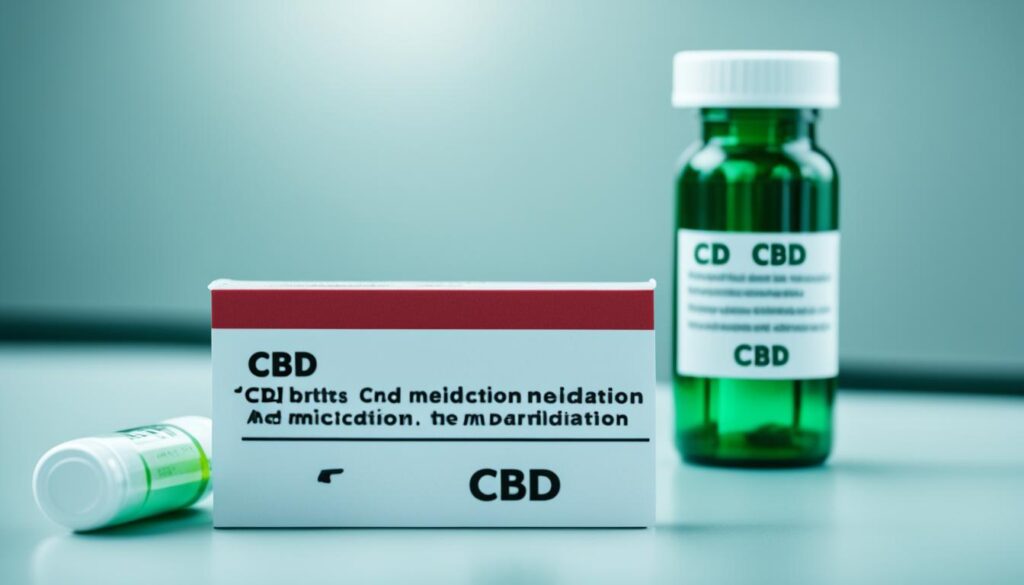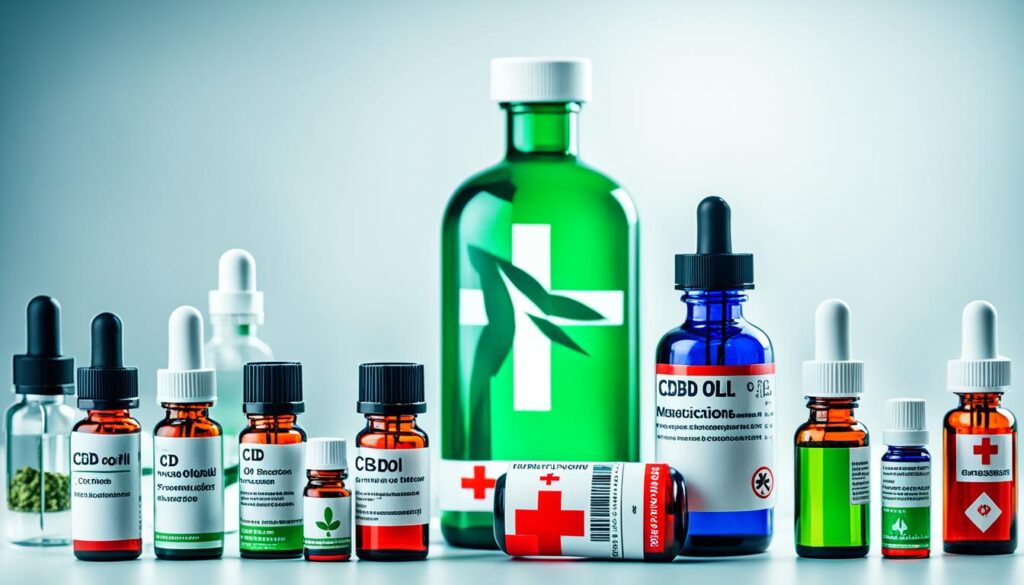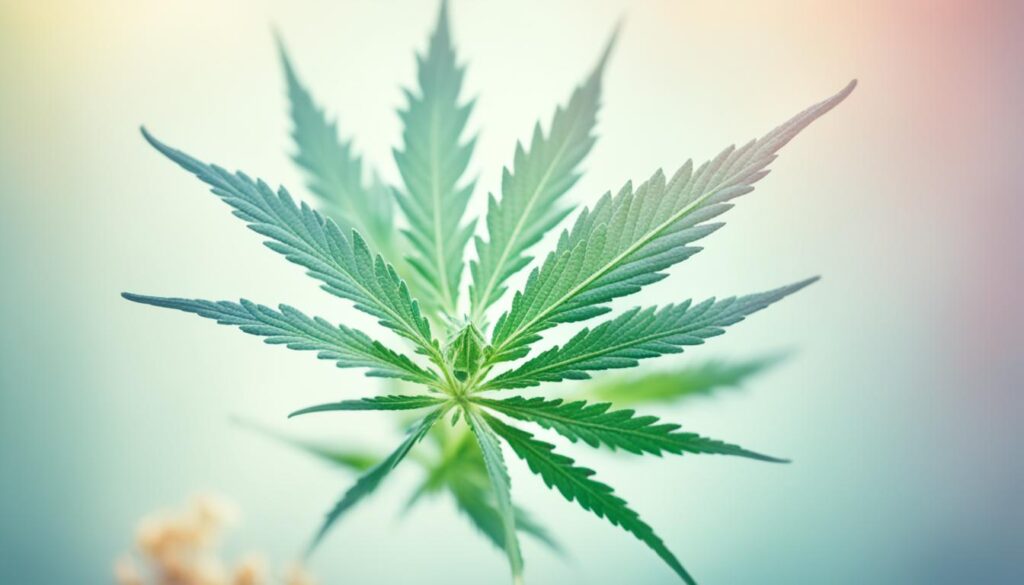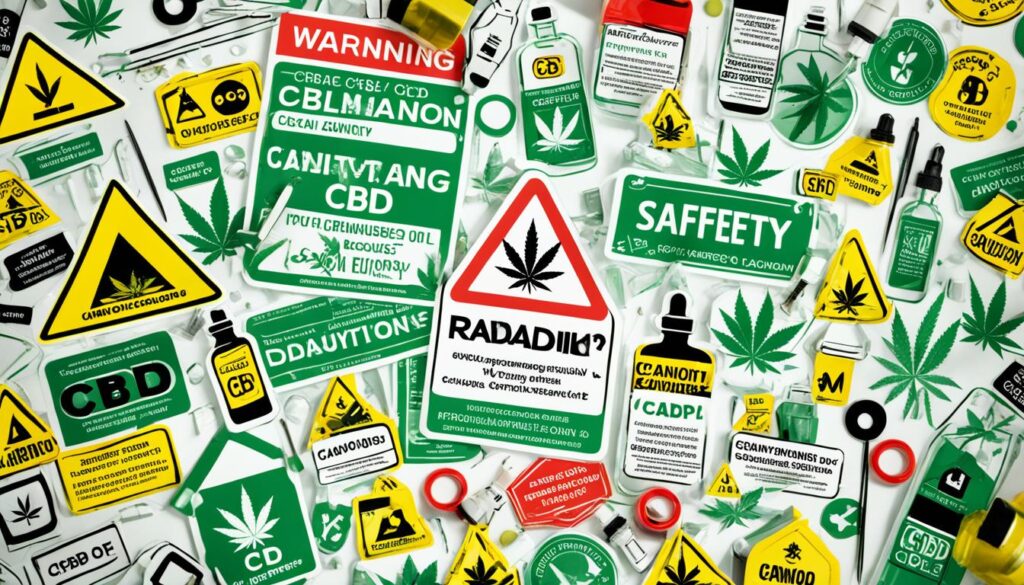CBD is getting more popular because of its possible health benefits. But, it’s important to know that CBD might not mix well with some medicines. This is because CBD can change how our liver works. It might make some medications less effective. So, you might wonder, Could CBD be affecting the medications you are currently taking?
It’s key to know which medicines could react badly with CBD. This keeps you safe and healthy. Talking to a doctor is the best way to make sure CBD and your medicines work together. This article will talk about the risks of using CBD, what the FDA thinks, its benefits, and its safety.

Key Takeaways:
- CBD can interfere with liver enzymes, potentially affecting the levels and efficacy of certain medications.
- Consulting with a healthcare professional is crucial to ensure CBD won’t negatively interact with your current medications.
- Consider the potential risks and precautions of CBD use before incorporating it into your treatment regimen.
- It’s important to note that over-the-counter CBD products are not regulated by the FDA.
- Research on CBD is ongoing, and further evidence is needed to fully understand its safety profile and long-term effects.
Potential Risks and Precautions of CBD Use
CBD has shown promise, but it’s important to know the risks. Taking precautions is key when adding it to your treatment. This includes thinking about drug interactions and other body effects.
Liver Health and CBD
CBD’s impact on liver health is a concern, especially for those with liver issues. It affects liver enzymes that break down medications. This might disrupt the removal of some drugs from the body.
It’s important to note that CBD can be harmful to the liver, especially for people with liver conditions.
If you have liver problems, talk to a doctor before using CBD. This ensures your safety.
Drowsiness and Sedation
CBD might make you sleepy or more sedated. It can boost the sedating effects of some medications, like benzodiazepines and opioids.
CBD can cause drowsiness and increase the drowsiness caused by other medications.
If you’re on medications that make you sleepy, be careful with CBD. Also, if your activities need you to be alert, take extra caution.
Other Side Effects
CBD can cause other side effects too. These include diarrhea, appetite changes, and mood swings. Watch how your body reacts to CBD and talk to your doctor about any worries.
Here’s a quick look at CBD’s potential risks and how to handle them:
| Potential Risks | Precautions |
|---|---|
| Liver impairment or conditions | Consult with a healthcare professional |
| Drowsiness and sedation | Exercise caution, especially when taking other sedating medications |
| Diarrhea, appetite changes, mood alterations | Monitor your body’s response and discuss any concerns with your healthcare professional |
FDA-Approved Use of CBD: Epidiolex for Seizure Disorders
The only FDA-approved CBD treatment is Epidiolex. It’s a prescription medication for some seizure disorders. Clinical trials show that Epidiolex is safe and effective. However, the FDA hasn’t extensively studied or approved other CBD uses. Before using CBD for any non-approved purposes, it’s crucial to talk to a healthcare professional.

CBD’s Potential Benefits
More research is crucial to fully grasp CBD’s therapeutic effects. Yet, evidence hints at its potential merits.
CBD could aid sleep, offering natural sedation for some dealing with insomnia. It might fine-tune sleep habits and boost sleep quality.
Studies point to CBD’s ability to lessen anxiety and depression symptoms. It seems to engage brain receptors affecting mood, cutting anxiety.
CBD could also ease pain and lessen inflammation in ailments like arthritis and cancer. It’s thought to influence the body’s system that handles pain and swelling.
“CBD has shown promise as a sleep aid, helping individuals with insomnia.” – Sleep Specialist Dr. Smith
CBD’s impact can differ across individuals, so more studies are needed. It’s not a replacement for medical care. People with ongoing health issues should talk to their doctors before using CBD.

CBD Safety and Regulation
Understanding CBD product safety and regulation is key. CBD items are not subject to the same checks as FDA-regulated medications. This means there could be issues with labeling or the amount of CBD they contain.
Customers should be careful when buying CBD products. Stick with items from trusted sources. This action helps avoid low-quality or misleading items.
It’s important to remember that CBD research is not finished. More studies are needed to know its safety and long-term effects. CBD seems helpful in treating conditions like epilepsy. But, we need more evidence to understand its safety and effectiveness fully.

The CBD market’s growth requires clear rules and standards by regulatory groups. Such measures will ensure product consistency, quality, and safety for consumers.
Being informed about CBD regulations and research is crucial for consumers. Talking to healthcare experts and researching before buying or using CBD can limit risks. This ensures users stay safe.
Interactions with Specific Medications
CBD’s potential interactions can vary with the specific medication taken. Being aware of these interactions is crucial for safe and effective CBD use. For example, some seizure medications, like clobazam, interact with CBD.
When CBD and these medications are used together, CBD may boost the medication’s effectiveness. This could lead to more sedation. If you work or operate heavy machinery, be cautious. Always talk to a healthcare professional or pharmacist before mixing CBD with seizure medications.
CBD can also affect medications metabolized by liver enzymes. These enzymes break down drugs in your body. But, CBD can slow down this process.
This may cause certain medications to build up in your body, raising their levels and possibly leading to unwanted side effects. It’s vital to talk with a healthcare professional to check if CBD affects your medications.
Potential Medication Interactions with CBD
| Medication | Interactions with CBD |
|---|---|
| Seizure Medications (e.g., clobazam) | Potential for increased sedation |
| Medications metabolized by liver enzymes | Potential for increased medication levels and potential side effects |
Remember, the list above does not cover all possibilities. CBD may interact with other medications too. If you’re concerned or have questions about CBD and your medications, always talk to a healthcare professional or pharmacist.

Talking to a healthcare professional is key for safety and getting the most from CBD. They can offer tailored advice based on your medication and health. By teaming up with your healthcare team, you can make smart choices about using CBD in your treatment plan.
Importance of Consulting with Healthcare Professionals
It’s vital to talk with a healthcare pro before adding CBD to your treatment. They offer insights on drug interactions and proper dosing. This guidance considers your unique health needs.
CBD may help in various ways, but it’s not a fit for everyone. Healthcare pros can offer advice based on your medical info and current meds.
“Talking to a healthcare pro is key before using CBD. They know how to guide you based on your health and CBD use.”
They address CBD concerns and help with product choices. They guide you on quality brands and the right dosage.
CBD isn’t a replacement for professional medical advice. Healthcare pros are crucial for safe and effective CBD use with other treatments.
Benefits of Consulting with Healthcare Professionals:
- Advice tailored to your personal health history.
- Expertise on drug interactions and dose setting.
- Help finding other therapies if CBD isn’t right.
- Guidance to reputable CBD products.
- Clarity on CBD use and concerns.
Consulting healthcare pros lets you make sound CBD decisions. Their insights ensure safe use, maximizing benefits and minimizing risks.
Comparing CBD Products
| Product Type | Administration Method | Onset of Effects | Duration of Effects |
|---|---|---|---|
| CBD Oil | Oral (sublingual) | 30 minutes to 1 hour | 4 to 6 hours |
| CBD Capsules | Oral (swallowed) | 1 to 2 hours | 6 to 8 hours |
| CBD Topicals | Applied to the skin | Varies | 4 to 6 hours |
| CBD Edibles | Oral (ingested) | 45 minutes to 2 hours | 4 to 8 hours |
It’s crucial to get healthcare advice to choose your CBD method. They consider your health history and goals to aid your decision.

CBD and Driving
When talking about CBD and driving, being aware is key. CBD can make you feel sedated, much like alcohol does. Thus, using CBD before driving or using machines may be unsafe.
If you’re also taking meds that make you drowsy, mixing them with CBD increases the risk. It’s wise to know how CBD might react with your meds. Always talk to a doctor before trying CBD if you’re not sure.

CBD has lots of benefits, but safety should come first. If you need to be focused, like when driving or using machinery, skipping CBD is best. This ensures you stay safe and keep others on the road safe too.
| Key Points | Additional Information |
|---|---|
| 1. CBD can have sedating effects similar to alcohol. | It’s important to be aware of the potential for impairment and decreased mental alertness when using CBD. |
| 2. Combining CBD with medications that cause drowsiness can increase the risk of accidents or impairment. | If you are taking other medications, it’s crucial to consult with a healthcare professional to understand potential interactions. |
| 3. Prioritize safety. | Avoid using CBD if you need to drive or operate machinery to ensure your own safety and the safety of others. |
CBD for Pets and Drug Interactions
Just like humans, pets can have drug interactions with CBD. It’s key to talk to a vet before giving CBD to your pet. This is especially true if they are on other meds. Vets can help with dosing and risks of CBD in pets.
“CBD has shown promise as a safe and effective treatment option for pets, but it’s crucial to approach its use with caution.”
CBD comes from the hemp plant. It’s popular for its possible health benefits in humans and animals. This compound works with the body’s system that controls pain, stress, and more.
Be aware of potential drug interactions with your pet’s medications. CBD can change how some drugs work. This may affect your pet’s health.
Consulting with a Veterinarian
Consulting a vet is crucial before using CBD for your pet. Vets understand animals and medication interactions well. They can guide you on the right dosage and how to give it.
- A vet can look at your pet’s medical history and current meds to spot risks with CBD.
- They can help you find the right dosage for your pet’s needs, ensuring it’s safe and effective.
- Vets can recommend safe, quality CBD products made just for pets.
Every pet reacts differently to CBD. Watch how your pet acts and how they feel with CBD. If you see anything odd, talk to your vet right away.
Research and Evidence
There’s some evidence and ongoing studies on CBD’s benefits for pets. But, our understanding of how it works on animals is still growing. Most research is on CBD products for certain conditions like seizures.
We need more studies to fully understand CBD’s benefits and risks in pets. Trust your vet and research before trying CBD for your pet.
Don’t use CBD products for humans on pets. Always pick ones specially made for animals.
Always talk to a trusted vet before starting any new treatment for your pet. They’ll consider your pet’s specific needs to help decide if CBD is right for them.

Conclusion and Final Thoughts
As CBD becomes more popular for its possible health benefits, being cautious is important. It might help with anxiety, pain, and sleep problems. But, it could also react with some medicines and be risky for people with liver issues. That’s why talking to a healthcare professional before using CBD is key.
Talking with your healthcare provider helps. They can check if CBD fits with your current medicines and health issues. They can advise on how much to take, possible side effects, and weigh the benefits and risks for you. Getting professional advice is crucial for making smart health choices.
Also, picking safe CBD products is vital. Even though research is still going on, remember that the FDA doesn’t regulate over-the-counter CBD products right now. So, it’s important to buy from trustworthy sources. Make sure the CBD products you get are high-quality and labeled right.
In the end, CBD might be a good option for those looking for different treatments. But safety comes first. Always talk with healthcare experts and keep up-to-date on CBD research and laws. This way, you can make well-informed choices about CBD. It might help improve your well-being if used correctly.